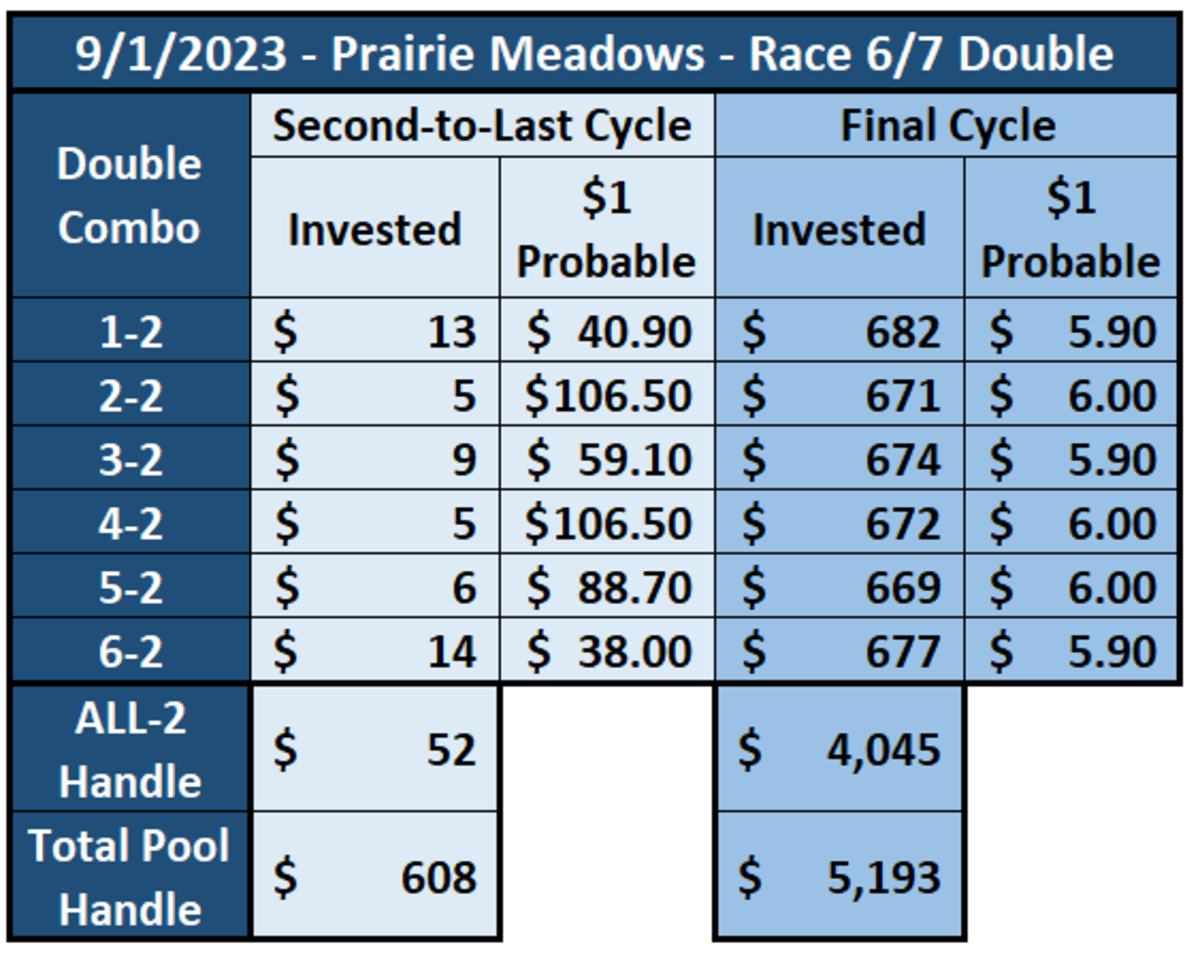Bettors seeking to land big scores through offshore bet-takers seem to have successfully manipulated betting pools at Iowa's Prairie Meadows at least three times in the last eight race days.
Daily double pools on September 4 (Races 2/3), September 1 (Races 6/7) and August 25 (Races 5/6) were subject to massive bets on combinations the manipulator/s expected to lose. In each case, the bets were made in the final betting cycle when projected payouts for each combination are not updated until the race was underway.
The Thoroughbred Idea Foundation (TIF) has drawn attention to such incidents, and the problems they create, at other U.S. tracks in the past. Most notably, Gulfstream Park eliminated its quinella pools after a significant manipulation event was detected in November 2022.
“These incidents at Prairie Meadows have all the hallmarks of pool manipulation based on TIF's multi-year focus and every time they occur, it calls into question the outcomes of the races involved,” said TIF executive director Patrick Cummings.
“Integrity is paramount and when pools are manipulated like this, bettors are rightly confused and can lose confidence that races are run fairly and the betting pools are operated fairly.
“We have tracked dozens of incidents of pool manipulation in the last three years. It is paramount that track operators, stewards and racing commissions act in tandem to uphold the integrity of the sport.”
Cummings spoke on the topic of pool manipulation at the 2022 University of Arizona Global Symposium on Racing. A replay of that session is below.
Pool manipulation can be challenging to police.
For the host track on whose races the manipulation occurred, the big bets manipulating the pool are new handle. The same applies for the manipulator's legal bet-taker, which has often been an advanced deposit wagering (ADW) outlet. For all other bettors on a race, an incident of manipulation often yields a payout far higher than they expected.
“If executed successfully, the track operator, bet-taker and bettor all feel like they've experienced some sort of minor windfall. They've all received more than they expected in handle, commissions or winnings,” Cummings said.
“In such cases, it's not easy to convince someone you have a problem.”
In these recent Prairie Meadows incidents, prior to the manipulation and just seconds before the start of the race, the eventual $1 winning double combinations were projected to pay $11.00 (9/4 incident – actually paid $27.40), $17.10 (9/1 incident – actually paid $89.60) and $5.80 (8/25 incident – actually paid $25.90), respectively. The average handle of the three double pools which were manipulated was over $4,950 while the average of all other double pools on those three race cards was just over $1,570.
The second-to-last and final betting cycles of the manipulated double pool from September 1 are reflected below.

The horse the manipulator needed to lose in the September 1 case was #2 Hoppin John, ridden by journeyman Ken Tohill for trainer Randy Morse. Hoppin John was sent postward at 10-1 in a six-horse field and finished fifth, beaten less that four lengths. The horse seemed to be racing into contention approaching the stretch.
When contacted by TIF, Brian Ohorilko, administrator of the Iowa Racing and Gaming Commission indicated the organization is attentive to these recent incidents.
“It is uncommon for us to have situations where we think there is suspicious betting but when it happens, we are in contact with the operator, tote companies and the Thoroughbred Racing Protective Bureau,” Ohorilko said.
“Once we fully understand what happens, we will pursue the best course of action which could include limiting betting into certain pools, the types of markets offered and potentially eliminating betting from hubs where these bets originated.”
The Asian Racing Federation's Council on Anti-Illegal Betting and Related Financial Crime addressed incidents of pool manipulation in a 2022 publication, which TIF highlighted at the time. A segment from TIF's past coverage is reprinted below.
“ARF Council member Thomas Chignell added insight on pool manipulation in a bulletin released concurrently with the Council's recent report:
“The bets placed into the tote are placed upon selections which are highly likely to lose and not on the most likely winning selection. The bets are large relative to the tote pool size and significantly shorten the odds on those selections, and in doing so, inflate the final dividend of the most likely winning selection which is subject to much larger bets with illegal betting operators.
“Incidents of dramatic, and often unexplained market movement, can cause confusion with regular bettors and undermine the public's confidence in the sport and the betting markets. Even if a racing authority does not operate the local tote betting, it is in the interest of the sport that customers believe the betting markets are fair and transparent.”
The post TIF: Prairie Meadows Hit By Spate Of Pool Manipulations appeared first on Horse Racing News | Paulick Report.
